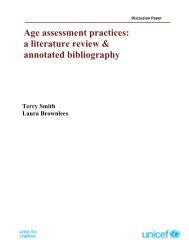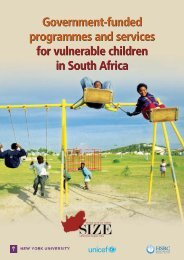Third and Fourth Periodic Report on CRC - Unicef
Third and Fourth Periodic Report on CRC - Unicef
Third and Fourth Periodic Report on CRC - Unicef
Create successful ePaper yourself
Turn your PDF publications into a flip-book with our unique Google optimized e-Paper software.
C<strong>on</strong>venti<strong>on</strong> <strong>on</strong> the Rights of the Child<br />
Bangla w<strong>on</strong> the prestigious Emmy Award in 2004. Also efforts are underway to launch a Children Televisi<strong>on</strong><br />
Foundati<strong>on</strong> to build instituti<strong>on</strong>al capacity for high quality children's programming <strong>on</strong> televisi<strong>on</strong> channels.<br />
DFP produced a 25-minute film combining various health messages <str<strong>on</strong>g>and</str<strong>on</strong>g> also developed another film <strong>on</strong> arsenic<br />
mitigati<strong>on</strong>. BSS is also producing features <strong>on</strong> development issues relating to children <str<strong>on</strong>g>and</str<strong>on</strong>g> women. The PID gave<br />
carto<strong>on</strong>s a new dimensi<strong>on</strong> by incorporating important messages <strong>on</strong> child marriage.<br />
Both print <str<strong>on</strong>g>and</str<strong>on</strong>g> electr<strong>on</strong>ic media ventured out of the c<strong>on</strong>venti<strong>on</strong>al studio-based formats towards communitybased,<br />
participatory <str<strong>on</strong>g>and</str<strong>on</strong>g> interactive programmes to promote children's participati<strong>on</strong> in media. Internati<strong>on</strong>al<br />
Children's Day of Broadcasting (ICDB) is observed regularly <str<strong>on</strong>g>and</str<strong>on</strong>g> feature programmes produced by children in<br />
Bangladesh Televisi<strong>on</strong> <str<strong>on</strong>g>and</str<strong>on</strong>g> Bangladesh Betar (radio). An innovative launch of the State of the World's Children<br />
2003 report was marked by stimulating intergenerati<strong>on</strong>al dialogue <strong>on</strong> the importance of children's participati<strong>on</strong><br />
in decisi<strong>on</strong>s that affect their life. The launch brought adult <str<strong>on</strong>g>and</str<strong>on</strong>g> children together in a panel discussi<strong>on</strong> in which<br />
adolescents shared their practical experiences from being involved in child-centred initiatives.<br />
Interacti<strong>on</strong> with children <str<strong>on</strong>g>and</str<strong>on</strong>g> young people <strong>on</strong> issues like poor sanitati<strong>on</strong> <str<strong>on</strong>g>and</str<strong>on</strong>g> HIV&.AIDS helped to get their<br />
views <strong>on</strong> important subjects. BTV gives children opportunity to articulate their views <strong>on</strong> issues that have a direct<br />
impact <strong>on</strong> their lives. Some private satellite televisi<strong>on</strong> channels, telecast programmes produced by young<br />
children with technical support of the channels. However, all the channels regularly air children's programmes.<br />
4.5 Freedom of thought, c<strong>on</strong>science <str<strong>on</strong>g>and</str<strong>on</strong>g> religi<strong>on</strong><br />
Citizens' rights to freedom of thought <str<strong>on</strong>g>and</str<strong>on</strong>g> c<strong>on</strong>science are guaranteed in the C<strong>on</strong>stituti<strong>on</strong> <str<strong>on</strong>g>and</str<strong>on</strong>g> also respected in practice.<br />
The fundamental right of citizens to profess <str<strong>on</strong>g>and</str<strong>on</strong>g> practise any religi<strong>on</strong>, subject to law, public order <str<strong>on</strong>g>and</str<strong>on</strong>g> morality,<br />
is recognized by the C<strong>on</strong>stituti<strong>on</strong>. The C<strong>on</strong>stituti<strong>on</strong> reflects the existence of <str<strong>on</strong>g>and</str<strong>on</strong>g> a tolerance towards different<br />
religi<strong>on</strong>s in the country. The Muslims c<strong>on</strong>stitute the majority populati<strong>on</strong> in the country. The c<strong>on</strong>stituti<strong>on</strong> ensures<br />
the right to practice rituals of all religi<strong>on</strong>s in peace <str<strong>on</strong>g>and</str<strong>on</strong>g> harm<strong>on</strong>y.<br />
Pursuant to the spirit of the C<strong>on</strong>stituti<strong>on</strong> there is a provisi<strong>on</strong> that exempts students from the obligati<strong>on</strong> to receive<br />
religious instructi<strong>on</strong> or attend or take part in any religious cerem<strong>on</strong>y or worship that relates to a religi<strong>on</strong> other<br />
than their own. The Government's policy <strong>on</strong> this issue is to arrange separate religious studies classes for<br />
children from different religi<strong>on</strong>s in primary <str<strong>on</strong>g>and</str<strong>on</strong>g> sec<strong>on</strong>dary schools. Teachers' training includes curriculum of all<br />
four major religi<strong>on</strong>s.<br />
The sanctity of all religi<strong>on</strong>s (including places of worship, sacred objects <str<strong>on</strong>g>and</str<strong>on</strong>g> religious cerem<strong>on</strong>ies) is preserved<br />
under a series of provisi<strong>on</strong>s in the Penal Code which impose criminal sancti<strong>on</strong>s for insulting the religi<strong>on</strong> or<br />
wounding/outraging the religious feelings of any community through certain specified acts.<br />
4.6 Freedom of associati<strong>on</strong> <str<strong>on</strong>g>and</str<strong>on</strong>g> peaceful assembly<br />
Bangladesh has a large number of children <str<strong>on</strong>g>and</str<strong>on</strong>g> youth organizati<strong>on</strong>s. They are located throughout the country,<br />
the largest having as many as 500 branches. Many children's organizati<strong>on</strong>s pursue programmes aimed at<br />
promoting the all-round development of children, while others have more specialized aims <str<strong>on</strong>g>and</str<strong>on</strong>g> activities. The<br />
members of these organizati<strong>on</strong>s tend to come from families of higher socio-ec<strong>on</strong>omic status. NGOs provide<br />
equivalent opportunities for many disadvantaged children.<br />
39
















